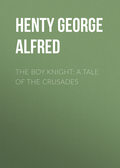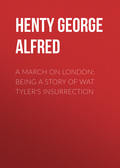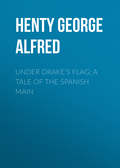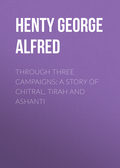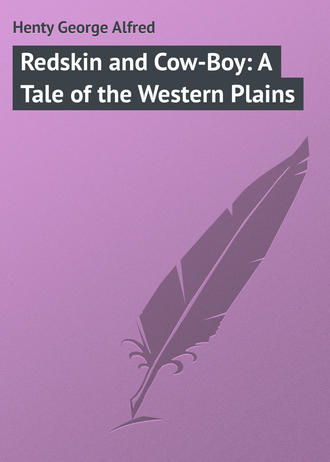
Henty George Alfred
Redskin and Cow-Boy: A Tale of the Western Plains
"Yes, I think the list is complete. I gave it to the old man, and he had all the things on board the first thing this morning. Here they are: six pounds of tea, a barrel of pork, sack of flour, keg of molasses, twenty pounds of sugar. Here is a box of dried apples, and the two cross-cut saws. He will see about a grindstone. He thinks you might make that one last a bit longer."
"It was pretty well worn out when it was put up," the foreman grumbled. "It ain't fit to grind axes on. I told the boss the other day that it had cost him ten times its vally already, because the men couldn't keep a sharp edge on their tools with it."
"Well, you know, Ben, grindstones don't grow down in M'Kinney, and he has got to get them sent out from Missouri."
"If he had to get them from China he might have had one here by this time," the foreman grumbled. "Have you got that bag of iron dogs I wanted?"
"No. There warn't one to be had in M'Kinney. The old man told me to tell you he wrote off on Saturday to Little Rock and told them to express them on."
A negro now came out from the hut and began to carry the provisions in, and Hugh followed the foreman into the mill. There was another man there. One side of the mill was open to a yard behind, in which lay the logs as brought down by the team. These were placed on rollers, and so run into the mill. One end of the log was then lifted by a screw-jack until level with the saw-bench. Here it was packed up, and the jack then taken to the other end. The machinery consisted solely of one large circular saw and of another of smaller size. The water-power would not have been sufficient to drive frame-saws, and the whole work had to be done with the circular saws. The mill was not large, but it sufficed for the wants of M'Kinney and the neighbourhood, and two waggon-loads of planks were sent down daily. Three axemen, who felled and squared the trees, and a teamster with four horses to drag the balks down to the mill completed the establishment.
Hugh soon found that the work was far more interesting than it had been in the woodyard. It needed a good deal of skill to handle the heavy pieces of timber and get them upon the saw-bench, although they were cross-cut by the woodmen into lengths suitable for planks. Then the great saw cut the balks into planks three inches wide. These were taken to the smaller saw, which ran them down into half, three-quarter, or inch planks, as required. The benches were of a primitive description, the balks being laid on fixed rollers, and the necessary movement given to them by a rope passed through blocks and taken round a shaft, which, as it revolved, wound up the rope and brought the logs forward against the saw.
The noise at first of the saws and of the water-wheel and its machinery almost deafened Hugh, but he soon ceased to notice it. He found that his duties were of a general kind. He assisted in raising the logs to their place and in getting them properly placed on the rollers, and then he helped to fix the blocks and pulleys, to remove the planks as they were cut off, and to work the log back to its place in readiness for another plank to be cut from it. The small saw required one man's constant attention, as the three-inch planks were simply pushed forward by hand against it, being kept in their true position by guides.
"You have got to be careful when you get near the end," the foreman said to him, "or you will find yourself without a finger or two in no time. When you get to within a foot of the end you must not push the plank any further, but go to the other end of the saw and pull it to you. It is a pretty rough business altogether, but it will only last another few months. There are not enough trees to supply it longer than that. Pawson has bought up another place a bit further among the hills, and he has ordered a better plant than this, and reckons it will be up and ready to run by the time we are done here. This place ain't fit for carrying on much trade. When it was put up two years ago there were but few people about on the plain, and a waggon-load a week was about the outside Pawson could get rid of. I have been here from the first. In those days we used to work with our rifles handy, for there was always a chance of an attack by Indians, but the country has grown so much since then that the Indians moved further north, and don't bother us. Ah! there is Joe's dinner-bell."
Hugh, following the example of the others, went down to the mill-stream and gave his hands a rinse, dried them on a towel hanging from a nail on the door of a hut, and then went in. In five minutes the whole party were assembled, and took their seats on benches beside a long narrow table. The negro cook brought in bowls of pea-soup. This was followed by boiled pork and potatoes, and then came a great dish of dried apples, boiled, with molasses poured over them.
"We get our board up here," the foreman, who had placed Hugh beside him, said. "I suppose the boss told you?"
"Yes, he said I should get forty dollars a month, and my grub."
"That's it. It is better pay than you can get on a farm below, but it is harder work, and lonesome; besides, unless you are careful, you run a pretty good risk of an accident. There have been eight or ten fellows hurt here since we began. It is healthy among the hills, and we don't get fevers, and it is cool enough to sleep comfortably at night even in summer, but in winter it is cold, I can tell you. The old man feeds us pretty well, I must say that for him, and he is as good a boss as there is about here."
Hugh liked the life, the keen mountain air braced him up, and every day he found it more and more easy to do his share of the work of moving the heavy balks. The men as a whole were pleasant fellows, and of an evening Hugh listened with great interest to the stories they told as they smoked their pipes. It was wonderful how many occupations most of them had followed. Two of them had been mining in California before they came down to Texas; one of them had been working with teams across the Santa Fé route; another, named Bill Royce, had been a sailor, had deserted his ship at Galveston, had enlisted and served for three years at a cavalry post west, had deserted again, had worked for two years as a cow-boy on one of the Texan ranches, had gone down into Mexico and worked at a ranche there, had come up by sea to Galveston, working his passage, had served as a farm hand for a few months, and then, after various experiences, had come to M'Kinney when there were only three or four houses there.
Another of the men had also worked as a cow-boy, but his experience had been but a short one.
"I stopped just a week at it," he said, "and what with being thrown off a horse twenty times a day, and what with the work, and what with the goings-on of the boys, I had enough of it by that time. I had been in one or two Indian fights, and I didn't feel scared then, but those cow-boys scared me pretty nigh to death. The way they let off their pistols was a caution. Four or five times, when I was sitting quiet, smoking, bang! and a revolver bullet would knock my pipe into chips, and then they laughed fit to kill themselves when I got up and swore. Then without the least reason, someone, as we were all sitting round the fire, would take it into his head to hit a little bit of flaming wood, then half a dozen others would go at it, and the bits of fire would be sent flying in all directions, and how it was that none of them got killed was more than I could make out. I stood it for the week, and then I weakened. I had got that nervous that I would jump if a fellow moved suddenly, and I concluded that I was not made the same way as the cow-boys, and had better quit and take to some other job."
"I reckon you were about right there," Bill Royce said. "Anyone as is thinking of going for a cow-boy, had best know how to ride, how to throw a rope, and how to draw his pistol as quick as lightning, before he begins."
The next day Hugh asked the teamster to bring him up from the town a rope, such as the cow-herders used.
"This will do," Bill Royce said, as he examined it. "The cow-boys and Mexicans both use ropes sometimes, but they chiefly make them themselves from strips of raw hide, which they work and grease until they run almost as easy as if they were made of silk. Yes, this is the right length, forty feet. Some men will use fifty, and I have known Mexicans who would throw a sixty-foot length with certainty; but that is quite out of the way; forty feet is the right length. I will splice one end into an eye for you, the other goes through it, and makes a running noose. When you throw it, the loop is three or four feet across. Of course, the better you can throw, the smaller you can have the loop, and the smaller it is the better, for the jerk comes all the quicker before the horse or steer is prepared for it. Now, you see that stump of a young tree sticking up two feet above the ground. Well, you form your loop, and you gather the rest in coils in your hand like this, and you stand, to begin with, twenty feet away, and you cast the loop over the stump – so."
Of an evening, when supper was over, Hugh went out and practised with the rope, and at the end of a month found that he could throw it at a distance of thirty feet with a fair certainty of dropping the loop over the stump. He also took Royce's advice as to the pistol. He had laid it by since arriving at M'Kinney; but he now got a belt similar to those worn by the cow-boys, and took to carrying the pistol in it, but unloaded, and at odd moments practised drawing from the belt, levelling it, and pulling the trigger with the greatest possible speed. The action seemed simple enough, but he was surprised to find how, with practice, the time taken in doing it diminished, and his fingers came to close upon the handle in exactly the right position almost instantaneously, and as his hand shot out, his thumb drew back the hammer, and his forefinger closed on the trigger. All this he had practised before, more or less, when he had learned to use the weapon in the conservatory at Byrneside, but at that time it had not appeared probable the accomplishment would be of any use. Now he knew that his life might depend upon it, and he came in time to be able to perform it, with, as Royce had said, something of the sleight of hand of a conjurer.
He devoted the whole of his spare time to practising with the pistol and rope, and by the time that summer had gone Hugh was able to throw the rope with certainty over any fixed object within reach, and to draw his revolver with a quickness that astounded Bill Royce.
"I have seen a lot of pistol shooting," the latter said, "since I came out west – cow-boys and Mexicans, and horse-thieves and such like, but I have never seen one draw as quick as you do, and there are many as draws quick. You shoot fair, but nothing out of the way. There's many a cow-boy kin shoot a sight straighter, but for quick drawing you are wonderful, and that is the great thing. When one fellow gets his pistol out, the other has got to cave in."
The valley was now pretty well cleared of its trees, and the party prepared to go down to M'Kinney for the winter. The wood-cutters were to move at once to the new location, and to begin to fell trees, and as soon as the snow fell deep the teams would go up and drag them down to the new saw-mill, for the timber is hauled down much more easily over the snow than over the rough ground in summer. Thus there would be a big stock in readiness when the thaw came, and the mill began to work in the spring.
Hugh was not sorry when the work of the mill came to an end. He had determined to remain until the season closed, and he was glad he had done so. The time had been by no means lost. He had learned a good deal as to the ways and character of the men with whom he should have to associate. He had from one or other of them picked up a great deal of knowledge about the country, and knew the best places for making a start, the towns from which most of the teams started, and the localities that were best to make for in order to gain the heart of the cattle country. He had learned to throw a rope with enough dexterity to aid him materially in any work he might undertake among cattle or horses, and his constant practice with his revolver gave him a confidence in himself, and in his ability to hold his own in the wild life of the plains and mountains.
In the nine months which had elapsed since he left England he had gained strength, had become manly and self-reliant, and felt that his apprenticeship had been of great value to him. The first thing to do after he came down to M'Kinney, was to look out for a horse. He had been put up to a useful wrinkle in this respect by Bill Royce. "You be careful about any horse trade you make. Bet your boots that any horse that is offered to you here is stolen, and you would get into one of the awkwardest of scrapes if you chanced to go into a district where that horse is known. They don't trouble themselves to ask many questions over a stolen horse. If you buy a horse, the best thing to do is to go before a justice, or the sheriff will do: pay your money before him, and get him to sign his name as a witness to the bargain. His fee will be one or two dollars, and you could not lay out the money better. Men ain't altogether unreasonable even where a horse is concerned, and a paper issued from a sheriff's office certifying that you had bought the horse, and paid a fair price for it, might save your neck from a noose. You may ride a stolen horse all your life, and never happen to light on the place he was taken from; but if you do happen to light on it, you may find yourself in a tight corner."
Hugh put up at the hotel, and having told the landlord that he was on the look-out for a horse, the latter told him one evening, when he returned from a visit to some friends at a farm, that two men had come in an hour before, and had said they had a good horse to dispose of. Bill Royce was sitting in the saloon when Hugh went in.
"I dropped in to see you, Hugh. I saw two fellows come in an hour ago on two likely-looking horses and they were leading two others, one of which seemed to me as good a bit of horse flesh as I have seen fur a long time. I expect they are on for a trade. The horse is a mustang; I don't expect they come by it honest, but that ain't your business, and you will get it cheaper than if they had. Go slow in bargaining; don't you let out you really want him."
Presently two men came in. They were dressed in broad hats, red shirts, over which they wore jackets with silver buttons, breeches made of a soft leather, and high boots. They wore bright-coloured sashes round the waist.
"They look pretty hard," Bill Royce said quietly; "they may be anything. They are not regular cow-boys, but they may have been working on a ranche; they may have been prospecting; they may be horse-thieves; they may be regular border ruffians; anyhow, they have got a horse to sell. Maybe they have stole it from a ranche; maybe they have got it from the Indians; maybe they have wiped out its owner. You will be able to tell pretty well by the price they want for it. He would be cheap at two hundred dollars if he is anything like as good as he looks. If they will take anything under that it is because they daren't keep him."
After standing at the bar and talking for some time to the landlord, one of the men came across to Hugh.
"I hear you are looking for a horse."
"Yes, I am wanting to buy one if I find one to suit me at my price."
"I have a horse to trade that would suit anyone, and as to its price, I am ready to let him go a bargain."
"I should like to have a look at him," Hugh said.
"Well, he is in the stable now."
"Yes; but I should want to see him by daylight, get on his back, and try him."
"Look here," the man said. "Me and my mate are pressed for time. Perhaps we have got an appointment with the president, perhaps we haven't; anyhow, we want to go on. We have got two spare horses, and we don't wish to bother with them no further."
"Well, I will look at the horse now," Hugh said, and, accompanied by Bill Royce, he followed the man to the stables. Two horses were standing, ready saddled and bridled, hitched to hooks outside the shed. Inside were two others. One was an ordinary-looking horse, bony and angular. A pack-saddle hung on a beam close by. He had evidently been used for carrying baggage. The other was a handsome roan, which snorted angrily as they approached with lanterns.
"That is something like a horse," the man said. "Five years old, strong, and up to anything, clean-limbed, full of courage, and fast."
"He has got a temper," Hugh said as the horse laid back his ears and made a sudden and vicious snap at the man's hand.
"He is a bit playful," the man said.
"Well, I don't like buying him without trying him," Hugh said. "He may be up to all sorts of tricks, and may kick his saddle over his head. What do you want for him?"
"I tell you what," the man said. "That horse would be dirt cheap at two hundred and fifty dollars, but as I have told you we want to be moving on, and I will sell him for a hundred and fifty. I would rather put a bullet through his head than let him go for less than that."
"Well, let us go back into the saloon and talk it over," Hugh said. "It is a rum way to buy a horse, but I like his looks."
The other man was still standing at the bar when they entered. Hugh, knowing that it would be an unheard-of thing to buy a horse without the ceremony of taking drinks being performed, went to the bar and ordered them for the four. "If I buy that horse," he said, "it will be on one condition. You see I don't know where he has come from. The man you got him from may have stolen him, and I might happen to come across the former owner, and I haven't any fancy for being strung up as a horse-thief."
"You don't mean, stranger, to say as we have stolen him?" one of the men said angrily.
"Not at all. It may have gone through half a dozen hands before it came into yours, and yet it may have been stolen. Of course, if you know anyone here who can guarantee that you raised the horse, or have owned him for a couple of years, I shall be quite content; but if you don't, you can hardly expect me to take your word any more than I should expect them to take my word if a party were to ride up to me and accuse me of stealing it. That is right enough, isn't it, landlord?"
"I don't see as there is anything to be said against that," the landlord said. "It is a mighty unpleasant thing in this country to be found riding on the back of a horse that has mayhap been stolen."
"What I propose is this," Hugh went on. "Seeing that these gentlemen are strangers here, I propose that I should call in the sheriff and James Pawson, who is a justice, and that they should witness the sale and give me a signed paper saying that they know me as a resident here, and that I have in their presence bought this horse. I don't think there is anything unreasonable in that. If at any time I am held up for stealing it I can show this paper, and if they doubt it they can write to the sheriff here, and find that it is genuine."
The two men exchanged a few words together in a low voice, and then the one who had shown the horse said, "Well, I reckon that is a fair enough offer. We know we came by the horse honestly, but as we are strangers it is right enough you should be cautious. Bring your sheriff along, and let's be done with it."
"I will fetch the sheriff across," Royce said, "if you go over to Pawson's, Hugh."
In five minutes they returned with the two men. The sheriff looked sharply at the two horse-dealers. They were unknown to him.
"Will you give me my belt, landlord?" Hugh said.
The landlord went out, and returned with Hugh's belt, which had been locked up in his chest since Hugh arrived in the town. The latter counted out 150 dollars in gold.
"Wait a moment," the sheriff said. "I must see the horse first, and see what brand is on him. I cannot describe the horse unless I see him."
Again taking lanterns the party went out to the stable. The horse had been branded with a circle in which was the letter E. There was no other mark on him. The sheriff brought across with him some official paper, and returning to the bar wrote: "I bear witness to the purchase by" – and he paused – "Hugh Tunstall," Hugh put in, – "who is well known to me as having been working for six months in and near the town, of a roan horse branded of" – "of Jake Wittingham," the man said – "and to the passing of payment for the same." The sheriff then added his name, writing under it, "Sheriff of M'Kinney County," and James Pawson added his signature with the word "Judge."
"That is right and square," the sheriff said. "Now, hand over the money and the trade is done."
"I will throw in the other horse for twenty dollars."
"I will take it," Hugh said; and adding this sum to that he had counted out, handed it over to the men.
"If you will just step over with me, Hugh," the sheriff said, "I will put my official seal to that paper. I have not a doubt," he went on as they left the saloon, "that those two fellows have stolen that horse. They would never have sold him for that money had they come by him honestly. I should have been glad to buy him myself for anything like that price. I don't know the men, and I reckon I know most of the rogues for a hundred miles round here; so that, if it has been stolen, it has probably been brought a good distance. I shouldn't be surprised if there has been murder as well as robbery. If I knew the men I would seize them and have them searched; but as I have never seen them before, and know nothing against them, I cannot do that. I think it is a very good idea of yours getting me in to witness the sale. That horse might get you into serious trouble if you could not prove that you came by it honestly."
He had now reached his house, and proceeded to stamp the document with the official seal. "You may as well put your signature to this," he said, "and I will witness it. Then if there is any question about your being Hugh Tunstall you would only have to sign your name and they would see that you are the man mentioned. That is right; my fee is two dollars."
Hugh gladly paid the money, and putting the document in his pocket returned to the hotel.
"Those fellows have just ridden off," Royce said when he entered. "Pretty hard couple that. I wonder where they got that horse. Nowhere about here, or the sheriff would have known it; a horse like that would be sure to catch the eye."
The next morning Hugh got up early to inspect his purchase. The horse again made hostile demonstrations when he approached it; but, talking to it quietly, Hugh went into the stall, patted and soothed it. When it had quieted down he took the head-rope and led it out into the yard.
"You are a beauty," he said; "there is no mistake about that," and, tying it up to a post, he walked round it. "Well put together, plenty of muscle, fine bone, and splendid quarters. What a hunter you would make if I had you at home!" The landlord came out as he was admiring the animal.
"A mustang," he said; "bigger than they usually run a good bit, and a beauty all over; he is worth double what you gave for him. This is not much of a horse country; if you had him down south you could get three hundred for him any day. I expect those fellows were afraid to take him down there; too well known, I reckon. Look here, I will give you a paper too; and if I were you I would get another from Pawson, saying that you have been working for him at his sawmill, and that he recommends you as a good hand at that work. You can't have too many certificates as to who you are when you are riding on an animal like that in this country. If you want a saddle and bridle, Jim Hoskings has got one to sell; he was speaking to me about it a fortnight ago."
Half an hour later Hugh became the owner of a saddle and bridle. The former was made in the Texan fashion, which closely resembles the Mexican, being very heavy, and with high peak and cantle.
"I hardly see how a man can be thrown off a horse with such a saddle as this," Hugh said as he examined it; "one would be boxed in before and behind."
"Wait till you get on a bad bucking horse," the man said with a smile. "You won't wonder about it then."
Carrying it back to the hotel Hugh saddled his horse and mounted. He felt strange and uncomfortable at first, for the stirrup-leathers were placed much further back than those to which he was accustomed. The stirrups were very large and broad, and the position of the stirrup-leathers rendered it necessary for him to ride almost with a straight leg, so that his grip was with his thighs instead of his knees.
"I shall get accustomed to him in time," he said to himself, "but at present I feel as if I was riding barebacked. Well, I had plenty of practice at that, so I ought to be able to stick on." He rode at a quiet pace down the street, and then shook the reins, and the horse at once started at a hand-gallop. Hugh was delighted with his pace, which was wonderfully smooth and easy, and returned in an hour fully satisfied with his purchase.



